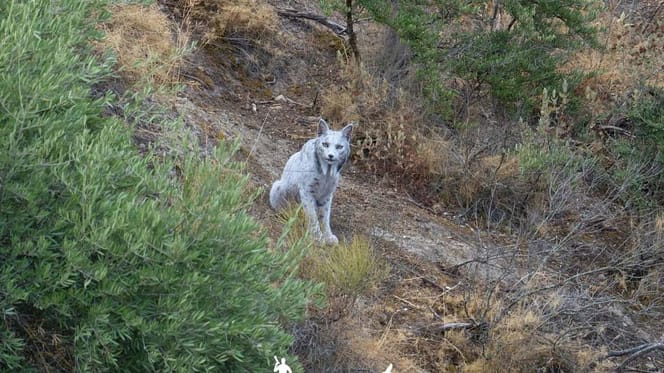The rugged mountains of Jaén, in southern Spain, are a place where nature remains largely untouched. A place where wild animals can retreat, far from civilisation. Nature photographer Ángel Hidalgo knows this region like the back of his hand.
He has set up several camera traps there. On 22nd October 2024, Hidalgo checks the images from one of his cameras regularly. He expects to see foxes, perhaps wild boar, with a bit of luck a lynx. But what he discovers on the screen leaves him speechless. Because it is absolutely spectacular!
A ghost in the forest
Between the dense trees of the mountainous region of Jaén, in southern Spain, a creature that resembles a ghost is on the move: a shimmering white Iberian Lynx, the first specimen of its kind documented anywhere in the world.
"I could barely believe what I was seeing," Hidalgo said in an interview with a local newspaper. "This animal was like a white shadow, silent, majestic, unreal."
A discovery that makes history
This extraordinary discovery took place on 22nd October and spread like wildfire on social media. The animal, a Lynx pardinus, is one of Europe's rarest wild cats.
But this lynx is exceptional: it has leucism, a genetic condition where the skin and fur are partially or completely lacking in pigment (unlike albinism, where the eyes are also affected).
The result: a snow-white predator with amber-coloured eyes that looks like something straight out of a fantasy film.
A glimmer of hope for a threatened species
The very existence of this animal is seen as a sign of the success of species protection programmes in Spain and Portugal. Just over a decade ago, the Iberian Lynx was on the brink of extinction, with fewer than 100 specimens still living in the wild.
Today, the Spanish Ministry of the Environment estimates their number at over 2,000 animals, spread across the Iberian Peninsula. Thanks to complex breeding and reintroduction programmes, the animals have spread once again.
The white lynx remains a secret
Hidalgo is keeping the exact location where the "white ghost of Jaén" was found a secret, and for good reason. The rare lynx is not wearing a collar, so it lives completely in the wild. Experts fear that too much attention would attract curious visitors, which would put the animal at risk.
"We don't want it to be disturbed," says the animal protection organisation Ahora Jaén. "It is a symbol of the fact that nature can still produce wonders if we leave it alone."


